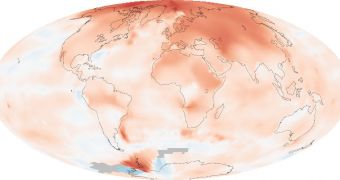According to a recent survey, it would appear that women are the most likely gender to understand and accept the truth about global warming and climate change, and also about the effects there phenomena have on our world.
The international scientific community has reached a consensus a long time ago that the two phenomena are currently taking place, that they are related, and the human activities promote their development and consequences.
But the general public is divided on this issue. Various interests are pushing agendas that have little to do with the scientific truth. Conservatory politicians and the fossil fuel industry are largely behind the misinformation.
A new study also shows that people themselves tend to disregard the opinion of experts if the scientists do not have a view that is in tune with the individuals' cultural values.
This type of behavior forbids many from seeing the truth, and allows them to keep a dispute going in a field where there is no room for such discussions.
The ClimateGate scandal was an attempt to divert attention from the issues at hand, and a pathetic one at that. Undoubtedly, many will use it as an “argument” for rebutting global warming for many years to come, but those who have looked at the evidence will recognize the deception immediately.
As the recent study demonstrates, women are more adept at doing so than men are. This could be owed to the fact that males are generally more stubborn, and a lot less likely to change their opinions.
This reluctance in the face of change happens even if they are presented with overwhelming evidence that refutes their claims.
Otherwise, there is no explanation why some cling on to one or two studies claiming that climate change isn't happening, in the face of literally hundreds which show that it is real.
The new investigation was conducted by researchers at the Michigan State University, who were led by associate professor and sociologist Aaron McCright.
He and his group looked at Gallup Poll data collected over the past eight years. The statisticians included various data in their surveys, including how many men and women agreed with the scientific consensus on climate change.
“Does this mean women are more likely to buy energy-efficient appliances and hybrid vehicles than men?” McCright asks.
“Do they vote for different political candidates? Do they talk to their children differently about global warming?” he goes on to say, adding that the discovery could have significant implications.
“Women and men think about climate change differently. And when scientists or policymakers are communicating about climate change with the general public, they should consider this rather than treating the public as one big monolithic audience,” he adds.
The new investigation is detailed in the September issue of the esteemed journal Population and Environment, LiveScience reports.

 14 DAY TRIAL //
14 DAY TRIAL //